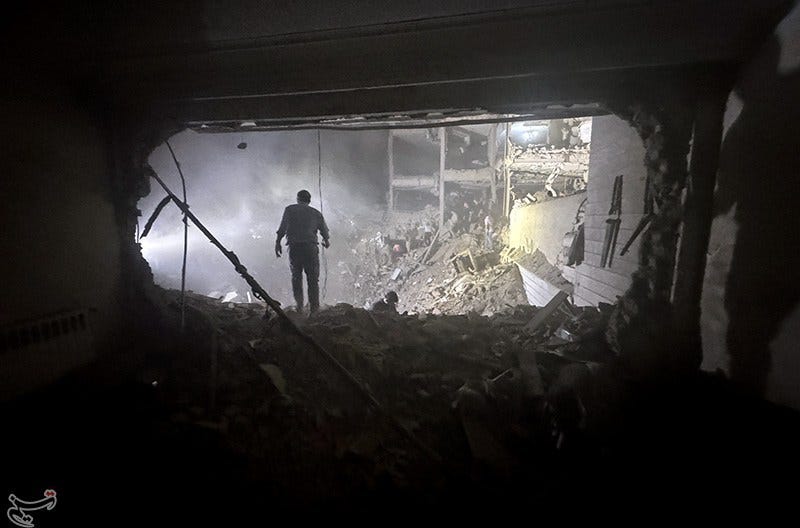
It’s so hard to know where to start a story. Choosing a starting point shapes the entire message and moral of whatever story you’re trying to tell.
And that’s especially true when it comes to something like the recent Israeli and American bombardment of Iran.
The simplest way to start would be to parrot what most Western governments and the mainstream media have been saying. For them, you need to begin with the fact that Iran was months, maybe even weeks, away from developing nuclear weapons. And that’s why Israel had to act.
That of course ignores the fact that Rafeal Grossi, the head of the International Atomic Energy Agency, says that there’s no evidence they were developing an atomic bomb. But let’s ignore that for now.
Instead, we could decide to start the story at another point, even a few weeks earlier. Let’s say June 3. That was when Israeli Prime Minister Benjamin Netanyahu began to be cross-examined during his corruption trial, which might see him land in prison. Netanyahu has succeeded numerous times in dragging out the trial, which has been going on for five years now, because he’s been leading the country, especially during times of war. However, this month, his coalition government appeared like it might fall apart. But while he’s at war with Iran, that’s certain to not happen.
Maybe we could go back even further, say to 2022 when Iranian women were leading the largest protest movement in fifty years after a young woman, Mahsa Amina, was killed by the regime’s morality police. Will the bombardment by two hostile powers strengthen similar opposition movements or will it be the most hardcore and militaristic elements of the government that gain the upper hand? That’s not a question I see being asked by much of the media these days.
Of course, we could go back even further. To 2018 when Donald Trump pulled the US out of an Iranian nuclear deal that had been working. To 2003 and George Bush’s Axis of Evil of speech and the invasion of Iraq. To the mid-90s when Ayatollah Ali Khamenei issued a fatwa against nuclear weapons, in all circumstances. To 1992, when Nentanyahu, then a backbencher, claimed that Iran was only a year away from developing a nuclear weapon.
All the way back to the Islamic Revolution of 1979, that created this theocratic regime and caused millions of Iranians to flee the country. To the western-backed coup of 1953 that brought the hated Shah Mohammed Reza Pahlavi back to power because the democratically elected prime minister was planning on nationalizing the country’s oil reserves.
Or maybe it would be best to start the mid-1800s, when Iran was so dominated by the Russian and British empires that they couldn’t even appoint their own cabinet ministers without foreign approval.
Where you begin the story in some ways will determine what you think of it.
And I think that helps me explain just how weird politicians and the mainstream media get when it comes to talking about this attack on Iran. They’re desperately grasping for any justification that they can get a hold of. At one moment, it’s all about ensuring that Iran doesn’t get nuclear weapons. Another, it’s retaliation for terror attacks and Iran’s support for Hezbollah or Hamas. Then all of a sudden it’s about regime change and freeing the Iranian people from tyranny.
It reminds me so much of Iraq, which I’ve been thinking about a lot in the last few months. And while so far we haven’t heard any talk of a ground invasion, the Iraqi example is illustrative. Western governments and the media convinced themselves beyond any doubt that Saddam Hussein had weapons of mass destruction. Which of course wasn’t true. But if you had the temerity to suggest that it might not be, you were labelled either naive or heartless or an apologist for a monstrous regime.
So during this moment, I wanted to talk a woman whose work I’ve followed for years, and who has been one of the most aggressive and thoughtful critics of the Iranian Regime.
Samira Mohyeddin arrived in Canada as a child in 1979, one of so many refugees of the Islamic Revolution. She’s a longtime journalist whose work often focuses on highlighting the crimes of the Iranian government.
But she’s also been an outspoken critic of Israel, especially the ongoing genocide in Gaza.
So I wanted to know how a woman like Samira is thinking about everything that’s going on. And where the story starts for her.
Featured in this episode: Samira Mohyeddin
To learn more:
“Iranians deserve a path to freedom that is also free from violence” by Samira Mohyeddin in The Globe and Mail
“‘I urge you to hear the voices of the Iranian people.’ Nobel laureate Narges Mohammadi remains unbowed” by Samira Mohyeddin in The Globe and Mail
“IAEA chief: No evidence Iran is building a nuclear weapon” in Al-Jazeera News
“Dragging Out Netanyahu's Trial Is a Delay of Justice for the Israeli Public” by Sami Peretz in Haaretz
Support us at hatchetmedia.substack.com
The Hatchet is a podcast and newsletter dedicated to exposing power and money in Canada. We deliver important, original and fascinating journalism about how this country actually works.
Music: I dunno by grapes (c) copyright 2008 Licensed under a Creative Commons Attribution (3.0) license. Ft: J Lang, Morusque













Share this post